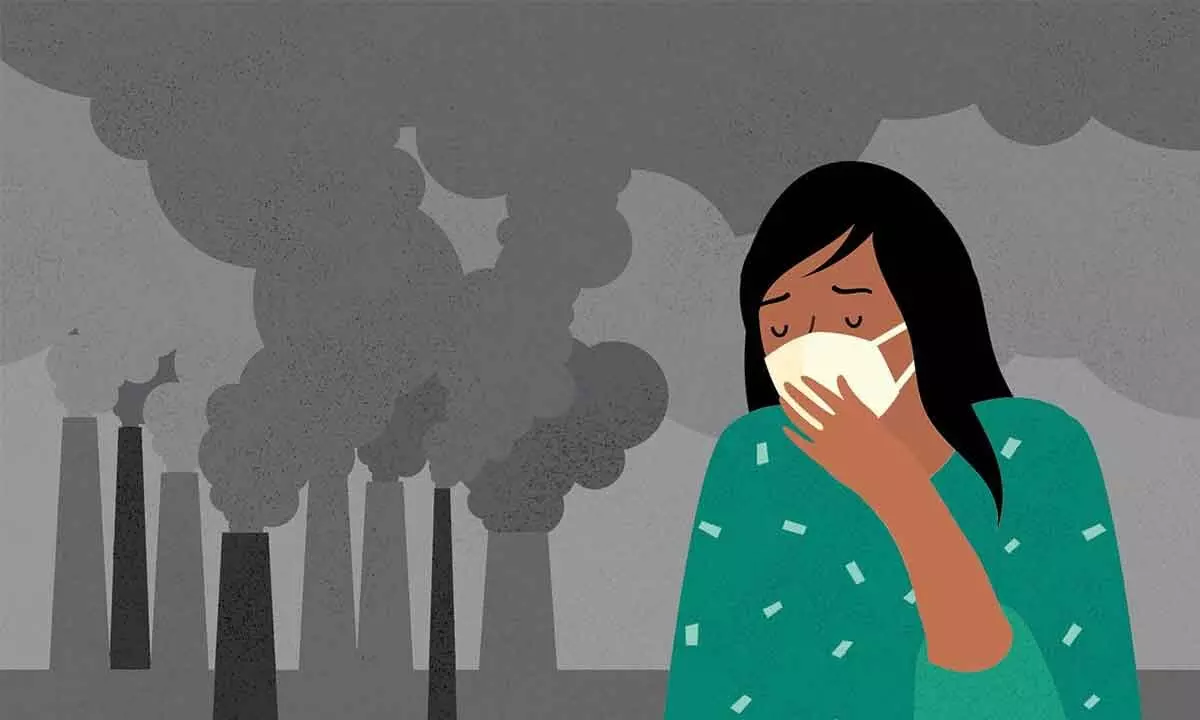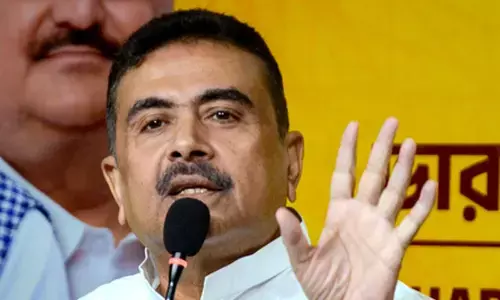Air pollution a risk factor for diabetes

Representational image
To date diet, obesity and physical exercise were the major factors behind increased prevalence of diabetes. Now, the study, published in the ‘British Medical Journal’ (BMJ), showed that inhaling polluted air with high amounts of PM2.5 particles led to high blood sugar levels and increased Type-2 diabetes incidence. The study examined the associations between ambient PM2.5 levels and fasting plasma glucose (FPG), glycosylated haemoglobin (HbA1c) and incident Type-2 diabetes mellitus (T2DM) among 12,064 participants in an adult cohort from urban Chennai and Delhi
New Delhi: Amid increasing levels of air pollution and cases of diabetes in India, a large study has established poor air quality as a risk factor for the development of the blood sugar condition in the country. To date diet, obesity and physical exercise were the major factors behind increased prevalence of diabetes. Now, the study, published in the ‘British Medical Journal’ (BMJ), showed that inhaling polluted air with high amounts of PM2.5 particles led to high blood sugar levels and increased Type-2 diabetes incidence.
The study examined the associations between ambient PM2.5 levels and fasting plasma glucose (FPG), glycosylated haemoglobin (HbA1c) and incident Type-2 diabetes mellitus (T2DM) among 12,064 participants in an adult cohort from urban Chennai and Delhi. The findings showed that for every 10 microgram/cubic metre increase in annual average PM2.5 level in the two cities, the risk for diabetes increased by 22 per cent.
“We observed that 10 microgram/cubic metre differences in monthly average exposure to PM2.5 was associated with a 0.40 mg/dL increase in FPG and 0.021 unit increase in HbA1c,” said correspondence author Dr Siddhartha Mandal from Centre for Chronic Disease Control, New Delhi, in the paper. “Further, 10 microgram/cubic metre differences in annual average PM2.5 was associated with 1.22 times increased risk of incident T2DM, with non-linear exposure response,” he added. The findings are alarming as India is already facing a high burden of diabetes as well as currently reeling under increased pollution levels. The recent Indian Council of Medical Research study titled INdia DIABetes shows that a tenth of all Indians have diabetes.
Meanwhile, the Air Quality Index (AQI) in Delhi-NCR remained in the “very poor” category for the sixth consecutive day on Thursday. It touched 351 at 10 am on Thursday in the national Capital. In the neighbouring Noida, the AQI touched 437, a whopping 469 in Greater Noida and 395 in Gurugram. Exposure to fine particulate matter had previously been associated with several cardiovascular and cardiometabolic diseases.
However, most studies that observed a positive association between ambient PM2.5 and incident T2DM were from low pollution settings, such as the US or countries in Europe. The new study thus provides evidence from regions with high air pollution levels, such as India, where the burden of non-communicable diseases is high.
“We observed evidence of temporal association between PM2.5 exposure, and higher FPG and incident T2DM in two urban environments in India, thus highlighting the potential for population-based mitigation policies to reduce the growing burden of diabetes,” Dr Mandal said. “We observed increased risk for developing diabetes in both cities against long-term exposure to PM2.5, although the largest effects were observed against 2 years and 1.5 years in Chennai and Delhi, respectively,” he noted.
Meanwhile, Delhi Environment Minister Gopal Rai on Wednesday held a review meeting with the concerned departments in view of the rising pollution levels in the national capital. After the meeting, Rai said that if Air Quality Index (AQI) levels remain above 400 at the hotspots and continue to be the same for the next one week, all construction work within one kilometre area of that hotspot can be directed to be stopped. Rai said that due to the onset of winter and low wind speed, the AQI in Delhi is around 350. “According to scientists, the temperature is decreasing rapidly, and the wind speed is also very low. The next 15-20 days are going to be crucial for Delhi. The CAQM had given instructions to implement GRAP-2, which has been implemented in Delhi.
Taking serious note of the matter, the Supreme Court on Tuesday called for affidavits from governments of Delhi and adjoining states detailing the steps taken by them to curb the air pollution. A bench comprising Justices S K Kaul, Sudhanshu Dhulia and Prashant Kumar Mishra remarked that on ground there is no improvement in air quality and steps shown to control pollution merely happen on paper. The bench took note of the report filed by the Commission for Air Quality Management (CAQM) on steps being taken to combat air pollution in the national capital and adjoining areas. In its report, CAQM said that there is a reduction of 40% in the air pollution compared to the past two-three years while crop burning remains to be a major cause for deteriorating air quality. The bench asked the concerned governments of Haryana, Uttar Pradesh, Punjab, Rajasthan and NCT of Delhi to file affidavits within a period of one week detailing respective steps taken by them to control the problem of air pollution.














